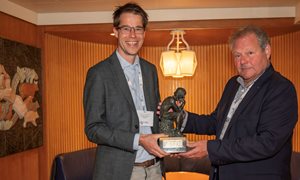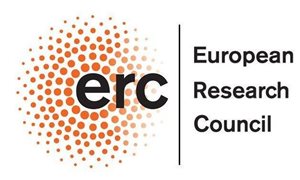
Maaike van Bergen, theme Cancer development and immune defence, and other researchers, published in Blood about specific proteome changes in platelets from individuals with GATA1-, GFI1B- and RUNX1-linked bleeding disorders.
A subset of inherited bleeding disorders is caused by mutations in the related transcription factors GATA1, GFI1B and RUNX1. Platelets from individuals with these mutations appear grayish in blood smear staining due to a lack of granules that are important for blood clot formation. As GATA1, GFI1B and RUNX1 interact at the protein and genetic level it has been proposed that they regulate similar gene programs.
Maaike van Bergen from the Van der Reijden group, Laboratory of Hematology, addressed this hypothesis by proteomic profiling of gray platelets from bleeding disorder cases with GATA1, GFI1B or RUNX1 mutations. Platelet proteomes were compared to those from healthy donors. In mutant derived platelets, a significant reduction of numerous proteins assigned to platelet function, hemostasis and granule biology was observed. Unexpectedly, none of the up- or downmodulated proteins were shared in common. These data indicate that mutant GATA1, GFI1B, and RUNX1 affect platelet proteomes in distinct, non-overlapping manners, despite the large overlap in platelet phenotypes. This work provides a basis to further our understanding of platelet biology and how mutant transcription factors deregulate platelet proteomes differently.
Related news items

T cell immunity is directed by tetraspanin CD53
5 July 2022 T cells are immune cells that are key for the defense against pathogens and cancer. T cells depend on the membrane protein CD45 to initiate T cell receptor signaling, but how CD45 is controlled at the molecular level is poorly understood. go to page
A single protein complex balances the very first lineage decision of cells in human: towards foetus or placenta
21 June 2022 The international group of researchers spearheaded by Dick Zijlmans and Hendrik Marks together with colleagues from KU Leuven, examined which proteins are associated with the chromatin and how this affects gene transcription. go to page
Dutch Society of Clinical Chemistry Science & Innovation Award for the team of Hans Jacobs
14 June 2022 The team of Hans Jacobs pioneers on the development of personalized diagnostics to measure minimal residual disease in patients with multiple myeloma. go to page
European grants for groundbreaking Radboudumc research Professors Roshan Cools and Peter Friedl receive ERC Advanced Grant
26 April 2022The European Research Council (ERC) is awarding grants to Roshan Cools and Peter Friedl, both professors at Radboudumc. While Cools will investigate how brains control behaviour in (stressful) situations, Friedl will work on developing a new cancer therapy.
go to page
Saponin-based adjuvant-induced dendritic cell cross-presentation is dependent on PERK activation published in Cellular and Molecular Life Sciences
20 April 2022 Lisa Huis in ‘t Veld, Nataschja Ho and colleagues from the team of Gosse Adema published in Cellular and Molecular Life Sciences that Saponin-based adjuvant-induced dendritic cell cross-presentation is dependent on PERK activation. go to page
Rubicon grants awarded to three RIMLS researchers
19 April 2022Three researchers have received Rubicon funding from NWO/ZonMw. This will enable Elke Muntjewerff, Laura de Vries and Laurens van de Wiel to do research at a foreign research institute for the next two years.
go to page